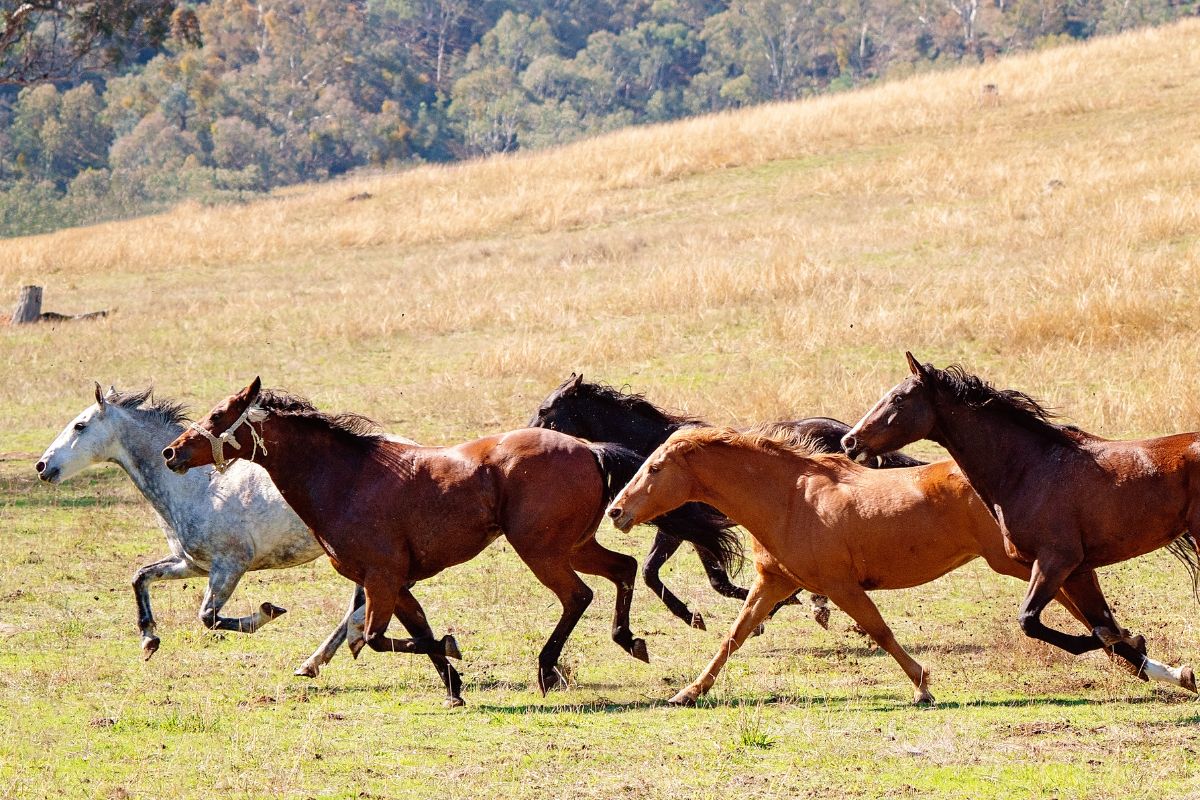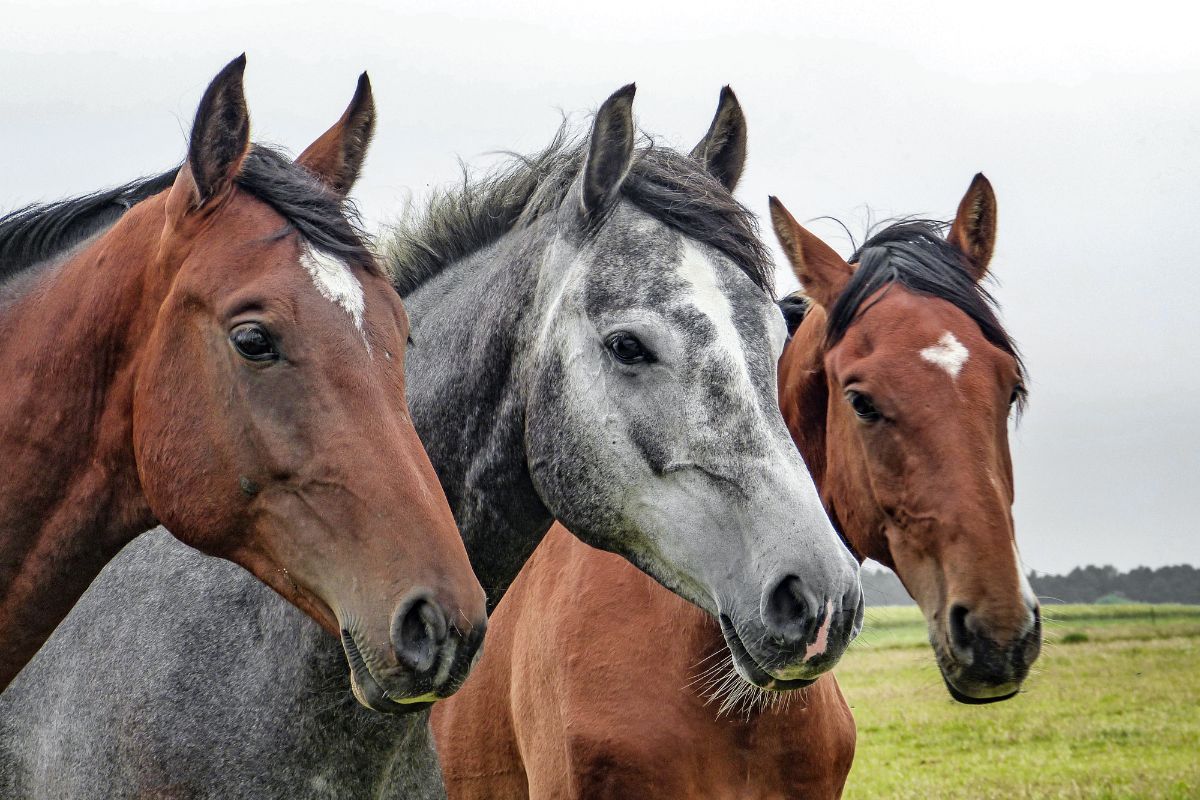How long do horses live is an age-old question that equestrians and non-equestrians alike ponder. The answer is it depends. Of course, there are some general guidelines. It’s commonly accepted that horses live between 25 and 30 years. Some estimates are more generous at 25 to 35 years. But that’s still a big window, and many factors influence horse lifespan.

How long do horses live? The general rule of thumb is that they live for 25 to 30 years. The American Association of Equine Practitioners states that the average lifespan of a horse is 30 years. A variety of factors influence how long a horse lives, and these should be taken into consideration if you are trying to estimate this for your equine companion (or potential equine companion). The breed of horse, their size, genetics, nutrition, and care can all influence how long a horse lives.
Horses live longer than other companion animals for a variety of reasons, primarily because of their slower metabolism. A slower metabolism, along with a lower resting heart rate and respiration rate, all increase the lifespan of a horse to that 25- or 30-year mark. Dogs, cats, and other companion animals have higher metabolism rates, as well as heart and respiration rates. These all contribute to their shorter lifespans when compared with the equine species.
Breed Influences Horse Lifespan
There are huge variations in how long a horse lives based on breed or type of horse. The average lifespan of a miniature horse is much larger than that of a draft horse. Again, we have a rule of thumb that goes with this, the larger a horse is, the shorter their lifespan, although a draft horse can still live approximately 25 years, which is still much longer than the lifespan of another companion animal. It’s commonly accepted and documented that miniature horses can live until they are 40 years old, and everyone expects ponies to live into their thirties.
Again, we have exceptions to these rules. The oldest living horse documented is Old Billy. He lived to be 62 years old and holds the record according to the Guinness Book of World Records. Old Billy was born in England in 1760 and died on November 27, 1822. Interestingly enough, he was a Shire/Cob cross (it is believed) and worked as a barge horse. Accounts of him state that he was a large horse, so he defies the size rule of thumb, but there are other factors that influence how long a horse lives.
Genetics
Genes are responsible for all sorts of traits; from what color a horse is to how tall it is. They can also influence how long a horse lives. This started with natural selection and survival of the fittest and has continued in our modern breeding practices. One reason is that those that live longer also have more opportunities to reproduce, therefore extending their own genes. While genetics do impact how long a horse lives, they aren’t something we have much control over, but we can influence the nutrition and care that our horses receive.
Nutrition and Care
Nutrition and care are two factors that greatly influence how long a horse lives. Horses that receive proper nutrition and care tend to live longer lives and remain useful for riding and driving longer than those without good care. This is one of the factors that makes Old Billy’s story interesting. It’s understood that workhorses during the 17 to 1800s lived hard lives, being treated the way we treat our cars. This lifestyle was one of the factors for the shorter lifespans of horses and humans. But Old Billy defied those odds, and we have to wonder if he lived in a loving home where he received good nutrition and care.
In other horses, lack of care leads to their untimely death. One example is Figure or the Justin Morgan horse. He died at age 32 in 1798, which is a long lifespan for that era. However, he may have lived even longer had he received proper care. Figure was kicked by another horse, the wound was untreated, and he died of tuberculosis.

Extending Horse Lifespan
There are steps any equestrian can take to extend their horse’s lifespan. These include regular dental care, veterinary care, farrier work, managing the horse’s weight, providing adequate exercise, managing hormonal issues (e.g., insulin resistance), and changing the diet as needed.
Dental care rises to the top of the list because of the way a horse’s mouth works. Their teeth grow continuously, and many older horses lose teeth and or the ability to properly chew their food. Left untreated, dental issues can manifest into life-threatening problems, whether through weight loss and malnutrition or serious mouth sores from sharp teeth.
Veterinary and farrier care are documented in Figure’s example, as well as many others. An overweight or underweight horse can have other health issues (including hormonal imbalances), so managing the weight is always important. Adequate exercise and keeping a horse active help them live a longer life, just like it does with people.
How Long Do Horses Live?
In summary, when asked, how long horses live, I still prefer to answer with, it depends. There are a lot of factors influencing a horse’s lifespan. It’s easy to default and say that the average horse lives for 25 to 30 years, but that doesn’t answer the true question. The average human lives 79 years in the United States, but we rarely focus on the number of years as much as we focus on the quality of our lives.
The same can be said for our horses. We should focus on the quality of the time we have with our horses, and in doing so, we invariably increase the amount of time that the horse lives. A well-cared-for horse with a quality life receives regular veterinary, dental, and hoof care and is a proper weight, with adequate exercise. All these factors help increase the lifespan of a horse and our enjoyment of them. In the end, that’s really the question we’re trying to answer too.
Sources: American Association of Equine Practitioners, Merck Veterinary Manual, The Horse, Equus Magazine, Cowgirl Magazine, and Guinness World Records.
